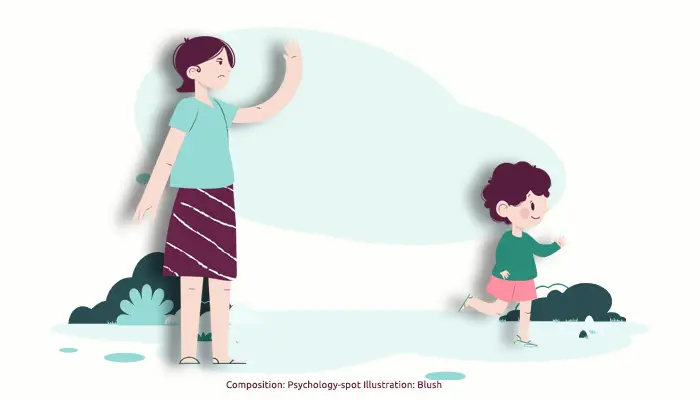
If you have a young child you know that the moment when you go out without him is one of the most difficult. Separate you from your little one it hurts, especially because he also doesn’t want to separate from you, a phenomenon that get worse when passing through the phase of separation anxiety. But you can’t always live beside him, and also these separations are useful because he develops his emotional independence, although at first it is difficult.
Some parents, in order to prevent the child from crying, get the house secretly. However, we should never get out without saying goodbye. Leaving the house surreptitiously is not the best thing for your children because it could generate in them an emotional wound difficult to heal.
Escaping furtively generates a feeling of abandonment
Escaping secretly won’t avoid the child’s suffering. The fact that you do not hear him crying doesn’t mean that he’s not suffering. In fact, it can be even worse, by the way when he cries because he sees you going out feels sadness, but when cries because he notice your absence may experience a feeling of abandonment, anguish and despair.
Young children find it difficult to bear the separation from their parents because they consider them a source of security and satisfaction of their needs. Therefore, the separation can be experienced as a real abandonment, even more if the parent disappears suddenly.
The effects of the feeling of abandonment that can experience small children should not be underestimated:
– Shock. At first the child usually reacts with tears, anger or a temper tantrum. Following can experience distress and anxiety.
– Insecurity. When the child suddenly realizes that his parents are not there, his world can falter, and this generates a strong insecurity. If instead of greeting him you flee secretly, the child doesn’t know when you might disappear again, so he will feel confused and perpetually insecure.
– Fear. Instead of teaching the child to deal with separation the escape generates further anxiety. As a result, it is likely that at your return it will be even more attached to you, it will adopt a vigilant stance to avoid being abandoned again. Also, it can begin to fear that even the others could abandon him.
– Guilt. If you often run away secretly, it is likely that the child begins to feel guilty. He’ll think he did something wrong and deserves to be “abandoned” and probably that will affect his self-esteem because he’ll think not to be worthy to be loved.
Several studies have analyzed the impact of the feeling of abandonment in children. A study by psychologists from the universities of Columbia and Duke analyzed 3,000 families in which the mother had abandoned occasionally their children. The researchers followed the children up to the age of five years old, and found that early maternal separation generated negative behaviors in children as young as three years of age and they also showed aggressive behavior reaching the five years old. Another study of the Columbia University found a relationship between the separation of those who mainly took care of the children and the poor academic performance at age eight.
Of course, that doesn’t mean that escaping secretly for a few minutes has the same effect on your son, as these investigations concerned longer periods of separation. But if you’re used to go out without saying goodbye and your son experiences this as abandonment, the situation can trigger a cascade of emotions and feelings that end damaging him.
On the contrary, every time you say bye to your baby you are building a relationship based on trust. Although at the beginning it is difficult, he will gradually realize that he can trust you, because even if you leave him for a while then you’ll return. Doing so you will encourage an open communication, which will be critical when he reaches the adolescence.
How to say bye to your son without turning it into a drama?
– Go preparing the ground. That way when you go out he will not be taken by surprise and starts to get used to it, although it is not necessary to warn him too early, 15 minutes early is more than enough. You can tell him: “Your grandmother will come soon, when we finish the snack you will say bye to mom.”
– Talk to him about what he will do in your absence. If you leave him a program the child will feel safer and less confused, and may even motivate him if he likes the plan. For example, you can tell him: “When your aunt arrives she will put on you your pajamas and read you that tale that you like so much, before going to bed.”
– Tell him when you return. If you tell him what time you come back, he will feel safer. So he will know that every time you leave, you’ll come back, and he won’t feel abandoned. If you don’t know when you come back you can tell him that you’ll be back when the shorter clock hand reaches a certain point. When you return, make him notice your punctuality, it will strengthen his trust in you.
– Establish a routine. Habits help children to have the feeling of control over the situation, and also help them transform a passive experience into an active one. But the way to greet him should be short, because otherwise, it is likely that the child begins to cry. For example, you can give him two basins and encourage him to keep them guarded for when you’re out and he will miss you.
Sources:
Howard, K. et. Al. (2011) Early Mother-Child Separation, Parenting, and Child Well-Being in Early Head Start Families. Attach Hum Dev; 13(1): 5-26.
Leventhal, T. & Brooks-Gunn, J. (2000)“Entrances” and “Exits” in children’s lives: Associations between household events and test scores. New York: Teachers College, Columbia University.



